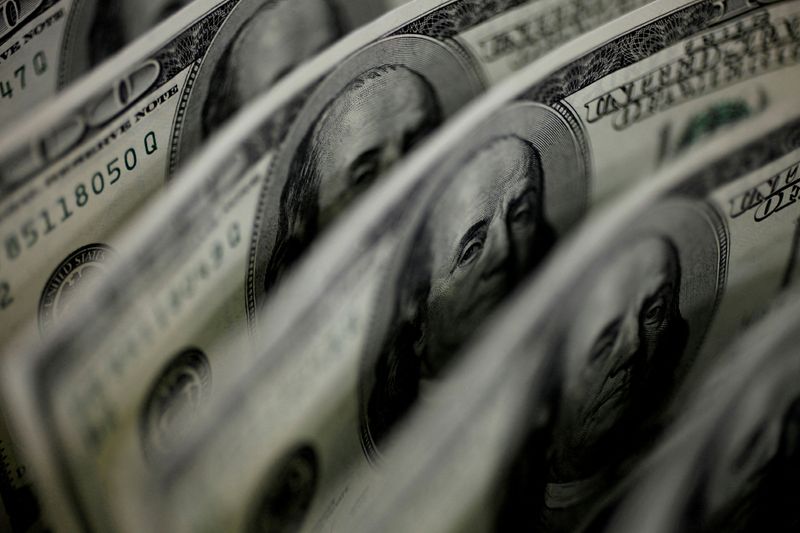By Saqib Iqbal Ahmed
NEW YORK (Reuters) - Investors reeling from the recent volatility in global financial markets are eyeing another potential worry: a rebounding dollar.
The dollar has risen nearly 4% from its recent lows and stands near a seven-week high against a basket of other major currencies, driven by bets the Federal Reserve will need to raise rates higher than many investors had previously forecast to cool inflation.
The U.S. currency remains some 8% below the twenty-year high it attained last year. Yet its rebound, along with a surge in Treasury yields, has already complicated the outlook for a range of trades that prospered as the dollar tumbled in the latter half of 2022.
MSCI’s index for emerging market stocks has slipped 8% from its January highs, while the MSCI Emerging Markets Currency Index is down 3% from its early February high.
A rally in European stocks has also stalled, with the Stoxx Europe 600 Index nearly flat for the last three weeks after having gained about 20% since late September. Gold, meanwhile, is trading flat on the year after having given up a 7% gain.
"A stronger dollar poses a problem for risk assets," said Lauren Goodwin, economist and portfolio strategist at New York Life Investments.
Because of the dollar's central role in the global financial system, its fluctuations have widespread repercussions.
A stronger dollar tends to tighten global financial conditions while diminishing appetite for risk-taking and weakening global trade, the Bank for International Settlements said in a report in November. It also makes it more difficult for countries that borrowed in the U.S. currency to service their debt, a problem often acutely felt by emerging market economies.
"The tailwind behind foreign currencies from a more dovish Fed is generally off the table," said Eric Leve, chief investment officer at wealth and investment management firm Bailard.
A stronger dollar also makes crude oil, gold and other dollar-denominated commodities more expensive to foreign buyers. Part of the 2% year-to-date decline in Brent crude can be traced to the dollar’s rebound, analysts at UBS Global Wealth Management wrote in late February. They expect China's reopening and Russian supply disruptions to override the U.S. currency's influence and boost oil later in the year.
For the U.S., dollar strength makes exports less competitive while weighing on the bottom lines of multinational companies by making it more expensive for them to convert foreign earnings into their own currency.
Morgan Stanley (NYSE:MS) analysts led by chief U.S. equity strategist Michael Wilson on Monday wrote that the dollar's directions could be a key factor for the near term trajectory of U.S. stocks, citing the currency’s relationship to global liquidity conditions. The S&P 500 index is down nearly 5% from its recent highs and holding onto a 3.6% year-to-date gain.
"If rates and the U.S. dollar continue higher we think these key support levels for stocks will quickly give way as the bear (market) resumes more forcefully," they wrote.
Whether the dollar continues its rebound will depend in part on investors' perceptions of how much higher the Fed will need to raise interest rates. Some insight into policymakers’ thinking and the economy's strength could come next week as Fed Chairman Jerome Powell delivers his semiannual monetary policy testimony before the Senate Banking Committee and the U.S. reports February employment data.
Colin Graham, head of multi-asset solutions at asset manager Robeco, believes the dollar is unlikely to rebound much further and said he would likely initiate bets against the U.S. currency if the dollar index rose to 106 from its current level of 104.
A move to the 114 level, the highs from September, would prompt him to abandon his bullish view on emerging markets, he said.
Emily Leveille, portfolio manager at Thornburg Investment Management, is also skeptical the dollar's bounce will last and views any weakness in emerging markets as a buying opportunity.
"Emerging market currency weakness can be a great time to step in and build positions in high-quality companies," Leveille said.

Analysts at Capital Economics, on the other hand, believe an expected slowdown in global growth and souring risk appetite will send investors flocking to the dollar, a popular destination during uncertain times, and push the currency back to its highs later this year.
"We expect risk sentiment to deteriorate amid this weakening global backdrop and 'safe-haven' demand to push the dollar higher over the next couple of quarters," they wrote.